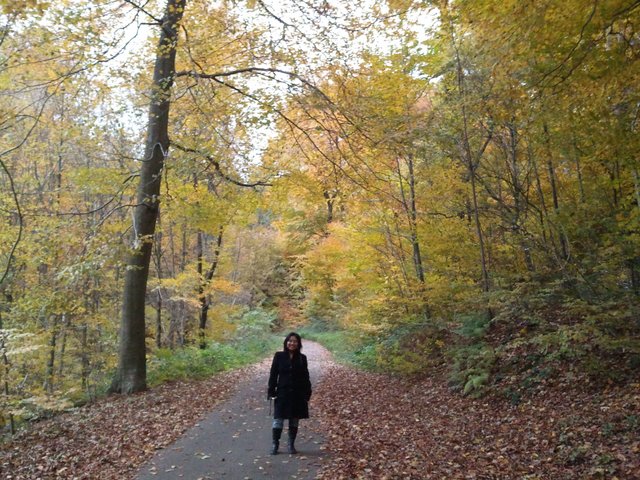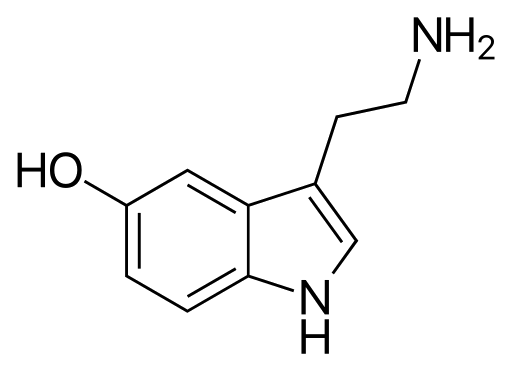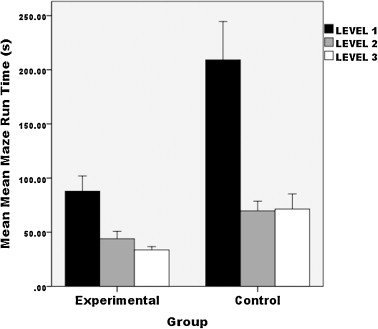As it is one of the requirements of the "SteemSTEM Writing Competition" I will start about why I chose my topic.
When I was still a student long time ago I had the habit to go to the near forest very often to learn there and prepare my coming exams. Actually I was holding the books in my hands and learning while walking ... Strange enough but I always had the feeling that learning in the forest would work much better than for example in a library.Some years passed and one day I red something amazing: according to a study of the researchers Dorothy M. Matthews and Susan M. Jenks[1] the ingestion of Mycobacterium vaccae[2] decreases fearfulness and improves the ability to learn in mice.
Mycobacterium vaccae naturally lives in the soil but can also be inhaled together with fresh air in the forest or while doing gardening. Was there finally a scientific explanation for my strange preference to learn in the forest (where the additional walking probably led to a better perfusion of the brain)? Even if very amazing I didn't do further investigations concerning this topic.
Yesterday though I happened to read a very interesting article of @justtryme90 about the phenomenon that people tend to be the less affected from depressions the more they are surrounded by vegetation.[3] Interesting enough to read these statistical underpinned observations, but what is actually the reason for it? Is it "only" the psychological effect that because of our evolutionary development within nature we just feel better, more happy and calm when surrounded by our "natural" environment or could maybe bacteria like Mycobacterium vaccae play a role as well? I decided to go back to the mentioned study of Matthews and Jenks to read it again and present their findings here.

My wife, walking through the autumn forest (and maybe inhaling M. vaccae? :).
Treatments with Mycobacterium vaccae activate the immune system and help against depressions
Since quite some time some researchers assume that the rise of allergies and asthma in western societies could surprisingly be the consequence of living too clean. Supposedly our immune systems can be better trained in the presence of nonpathogenic bacteria like Mycobacterium vaccae.
Amazingly some studies hinted in a way that not only the immune system benefited from the bacteria treatment but in addition it had a positive effect on patients who suffered under depressions. When for example lung cancer patients got injected heat killed M. vaccae they showed not only an improved median survival[4] but also seemed to feel less depressed and sick.[5]
|
Researchers found out that specific serotonin-releasing neurons were
activated in mice after they got injected M. vaccae. Serotonin or 5-hydroxytryptamine (5-HT) is a monoamine neurotransmitter which besides many other functions has the effect to balance our mood, makes us feel better and more relaxed.[6] |

By CYL - Own work, CC BY-SA 3.0, https://commons.wikimedia.org/w/index.php?curid=18074053 |
The hypothesis of the neuroscientist Christopher Lowry and his collaborators was that bacteria would activate immune cells, which then release so called cytokines, small proteins which play an important role in regulating growth and differentiation of cells.[7] These cytokines then should finally affect and enhance the activity of serotonin-producing neurons.
To verify their theory they injected pulverized bacteria into mice. Later they could indeed measure a higher concentration of cytokines than normal in the bodies of the animals. Apart from that they found an increased activity of serotonin-producing nerve cells in the dorsal raphe nucleus[8] of the brains of the treated mice as well as an over-average serotonin concentration in their prefrontal cortex.
In another experiment they observed that treated mice which were dropped into water did swim more persistent than untreated ones - that means to inject the bacteria had exactly the same effect as antidepressant drugs.
All these tests[9] let assume that walking through nature and inhaling soil bacteria could brighten up our mood ... and in future it may be possible to produce drugs against depression which contain a natural immune system stimulating bacteria-extract ...Interesting in this context is that the treatment with M vaccae not only increases the production of serotonin but also may help against depression by another mechanism as well. Several recent studies (where one example is the research of Miller & Raison[10]) come to the conclusion that inflammations actually can cause or at least promote depressions. Mycobacterium vaccae may actually ease inflammations and thus depressions by triggering the production of immune cells that curb the inflammatory reaction. There are several studies pointing in this direction.[11], [12]
The effect of Mycobacterium vaccae on learning ability
The above is amazing enough but there comes even more: let me remind you at the study of Matthews and Jenks which I mentioned at the beginning of this article.[1] Since serotonin plays a role in learning, the two female researchers wanted to find out if by the increase of the serotonin production the ingestion of M. vaccae would not only decrease the anxiety of the animals but also improve their learning ability.
They fed mice with living M. vaccae. Then the animals had to find their way through three maze difficulty levels (over 12 trials for four weeks) to get their rewards. The scientists observed that the bacteria-treated mice showed not only less anxiety-related behavior but also needed only half of the time of the untreated mice to find the way through the labyrinth!
Here you can see the construction of the maze and the results (from the same source[1]):|
The maze
|

|
It's also interesting that "The effects of M. vaccae treatment in the complex maze lasted 8 weeks". More data can be found in the original source.
Does inhaling bacteria increase intelligence? At least it seems to increase the learning ability for a certain period of time and intuitively I came to the right decision to learn in the forest ... :)
Sources:
- http://www.sciencedirect.com/science/article/pii/S0376635713000296
- https://en.wikipedia.org/wiki/Mycobacterium_vaccae
- https://steemit.com/science/@justtryme90/our-mental-health-is-improved-by-seeing-and-hearing-nature-especially-for-city-dwellers
- https://www.ncbi.nlm.nih.gov/pubmed?cmd=Retrieve&db=PubMed&list_uids=11899903
- http://discovermagazine.com/2007/jul/raw-data-is-dirt-the-new-prozac
- https://en.wikipedia.org/wiki/Serotonin
- https://en.wikipedia.org/wiki/Cytokine
- https://en.wikipedia.org/wiki/Dorsal_raphe_nucleus
- https://www.ncbi.nlm.nih.gov/pmc/articles/PMC1868963/
- http://www.nature.com/nri/journal/v16/n1/full/nri.2015.5.html
- https://www.ncbi.nlm.nih.gov/pmc/articles/PMC4896712/
- http://www.nature.com/news/vaccine-hope-for-post-traumatic-stress-1.17746

Thank you very for this interesting article, @jaki01. I resteemed it and definitely should go for a stroll in the forest now. ;-)
Downvoting a post can decrease pending rewards and make it less visible. Common reasons:
Submit
Nice to see that you like my text.
All this is another reason to protect the forests. :)
Downvoting a post can decrease pending rewards and make it less visible. Common reasons:
Submit
Mycology is absolutely fascinating and the healing potential both for the Earth as well as for us is, not only underrated, but monumental. Thank you so very much for sharing such an important piece of science with us. Maybe, thus, you'd also be interested about this article I came across yesterday about this open-source depository for science?
Check it out: https://steemit.com/science/@lemouth/a-publication-portal-for-open-global-and-perpetual-access-to-science#@lemouth/re-eric-boucher-re-lemouth-a-publication-portal-for-open-global-and-perpetual-access-to-science-20170304t133843795z
All for one and one for all! Namaste :)
Downvoting a post can decrease pending rewards and make it less visible. Common reasons:
Submit
Thanks for reading and commenting! And yes, I already saw this article - I really appreciate that initiative to make knowledge allocable more easily for everyone who is interested.
Downvoting a post can decrease pending rewards and make it less visible. Common reasons:
Submit
The bomb thank for sharing added to my list of examples why nature rules and we are stupid mice in a maze :) ( concrete jungle :| )
Downvoting a post can decrease pending rewards and make it less visible. Common reasons:
Submit
Now I know why gardening makes me feel happy and maybe someday I'll be a genus lolol
Downvoting a post can decrease pending rewards and make it less visible. Common reasons:
Submit
Good luck! ;-)
But I will be one too, as I like it so much to walk through the forest. :)
Downvoting a post can decrease pending rewards and make it less visible. Common reasons:
Submit
This is a great post. I am curious if there is a decreased level of this precious bacteria in soil where it is treated with chemicals. Thus, could an organic gardener enjoy higher levels of the M. vaccae?
Downvoting a post can decrease pending rewards and make it less visible. Common reasons:
Submit
Thanks for commenting! :)
I must say that in our own garden we don't use any chemicals (neither artificial fertilizers nor any pesticides). My personal believe is that they impair the quality of the soil (and can also harm useful insects) in the long run. Some articles are supporting my point of view. For example here you can read "Synthetic fertilizers kill a large percentage of a soil's naturally-occurring microorganisms."
On the other side there are of course different opinions as well and the matter is rather complex. That means it is not so easy to make a simple conclusion like "All chemicals are always bad." Of course it also depends on what exactly you use and how much ...
Concerning M. vaccae I don't know if it is more, less or equally affected than/as other soil bacteria.
Downvoting a post can decrease pending rewards and make it less visible. Common reasons:
Submit
Anyway, that's a really good science article again, which presents a very surprising observation.
Downvoting a post can decrease pending rewards and make it less visible. Common reasons:
Submit
thanks to abit, he actually reads, the first whale that votes comments that aren't below him :D
Downvoting a post can decrease pending rewards and make it less visible. Common reasons:
Submit
Food for thought for sure.
Downvoting a post can decrease pending rewards and make it less visible. Common reasons:
Submit
So far I only know I consume bacteria from a drink called Vitagen
Downvoting a post can decrease pending rewards and make it less visible. Common reasons:
Submit
Actually they are everywhere, also inside of us. :)
Downvoting a post can decrease pending rewards and make it less visible. Common reasons:
Submit
This is really interesting. I should then get into gardening soon!
Downvoting a post can decrease pending rewards and make it less visible. Common reasons:
Submit
Right, especially as gardening has further benefits as well. :)
Downvoting a post can decrease pending rewards and make it less visible. Common reasons:
Submit
Thanks a lot for your contribution to the contest :)
Downvoting a post can decrease pending rewards and make it less visible. Common reasons:
Submit
Thanks, too: to offer these competitions should be a very good thing for steemit I guess.
Actually I imagine it is rather difficult to chose the winners because the topics (as well as the writing styles and appearances of the articles) vary so much - and also for the authors it is always the question either to focus on accuracy and the details of what they describe or more on readability, "fun" and nice pictures (you may say both is possible at the same time ... maybe ... :).
Downvoting a post can decrease pending rewards and make it less visible. Common reasons:
Submit
Since the number of participants is of order 10 and not hundreds, it is still a manageable task with three judges :)
Downvoting a post can decrease pending rewards and make it less visible. Common reasons:
Submit
Haha, as far as I know, the deadline is not yet reached ... I may convince some friends to join steemit, take part in the competition and cause you lots of work! ;-)
Downvoting a post can decrease pending rewards and make it less visible. Common reasons:
Submit
I would be more than happy if you do that. I am always happy to learn new things :)
Downvoting a post can decrease pending rewards and make it less visible. Common reasons:
Submit
I know ... actually I try my best, but many people are often somewhat hesitant to do/join something new ... Patience is needed.
(At least I could already "gain" @hagbardceline for the platform, who is really knowledgeable in informatics related topics like programming languages, crypto currencies, encryption and many more.)
Downvoting a post can decrease pending rewards and make it less visible. Common reasons:
Submit
You should convince him to participate. We have no IT entry so far :)
Downvoting a post can decrease pending rewards and make it less visible. Common reasons:
Submit
I just messaged him, even if the deadline could be too near already. If not this time, maybe he decides another time to take part, lets see. :)
Downvoting a post can decrease pending rewards and make it less visible. Common reasons:
Submit
Very informative post. Highly recommended.
Downvoting a post can decrease pending rewards and make it less visible. Common reasons:
Submit
I am glad to see that you found this article to be interesting!
Downvoting a post can decrease pending rewards and make it less visible. Common reasons:
Submit
now I know why some of the old Dr's would always say. "let your kid play in the dirt more"
Downvoting a post can decrease pending rewards and make it less visible. Common reasons:
Submit
Right, that's exactly how "mnn" did express it: "How playing in dirt boosts your health". :)
Downvoting a post can decrease pending rewards and make it less visible. Common reasons:
Submit
Thank you for your submission, I have recorded it in our voting spreadsheet.
Downvoting a post can decrease pending rewards and make it less visible. Common reasons:
Submit
Downvoting a post can decrease pending rewards and make it less visible. Common reasons:
Submit
No chance my friend. I won't let any submissions fall through the cracks!
Downvoting a post can decrease pending rewards and make it less visible. Common reasons:
Submit
Interesting article. Thx 4 sharing - resteemed :-)
Downvoting a post can decrease pending rewards and make it less visible. Common reasons:
Submit
Thanks a lot! :)
Downvoting a post can decrease pending rewards and make it less visible. Common reasons:
Submit
Interesting and useful information! Thanks so much for sharing! :)
Downvoting a post can decrease pending rewards and make it less visible. Common reasons:
Submit
Thanks for reading and commenting! :) I hope it is "readable" enough ...
Downvoting a post can decrease pending rewards and make it less visible. Common reasons:
Submit
You're welcome! :)
Downvoting a post can decrease pending rewards and make it less visible. Common reasons:
Submit
And bacteria can also defend the human race against alien aggresion as you can see in 'The War of the Worlds'. :D
A really interesting article. Thank you! :)
Downvoting a post can decrease pending rewards and make it less visible. Common reasons:
Submit
Thanks for commenting and I am glad that you find it interesting. :)
Downvoting a post can decrease pending rewards and make it less visible. Common reasons:
Submit